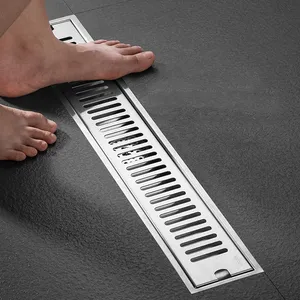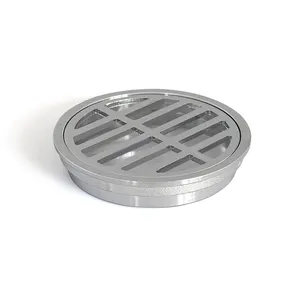Driveway drains are drainage solutions specifically designed to address water runoff issues in driveways. They find applications in residential driveways, commercial parking lots, and any other areas where efficient water management is essential. Also, they are integral in preventing water-related damage and maintaining the integrity of the driveway surface.
Types of driveway drains
Driveway drains come in various types, each tailored to specific needs, and they offer distinct benefits and advantages. Driveway drainage in the form of channels is visible on the surface and is typically made of durable materials like concrete or polymer. These channels efficiently collect and redirect water, preventing surface pooling and potential damage. One key advantage is their ease of maintenance, as they are easily accessible for cleaning. Driveway trench drains, on the other hand, are installed below the surface, capturing water and directing it away from the driveway. This discreet solution reduces tripping hazards and enhances the aesthetics of the driveway.
Both types share advantages such as efficient water management, contributing to the prevention of erosion and structural damage caused by water accumulation. Driveway drain grates serve as protective covers for openings in drainage systems, preventing debris entry and reducing the risk of clogging. The benefits of these driveway drains include durability, versatility, and minimal maintenance, making them essential components in preserving the integrity of driveways and surrounding areas.
Materials and features of driveway drain grates
Driveway drains are crafted from durable materials and incorporate essential features to efficiently manage water runoff and protect driveways from potential damage. These drainage systems commonly utilize robust materials such as reinforced concrete for driveway trench drains. The durability of these materials ensures resilience against various weather conditions, maintaining the structural integrity of the drainage system over time.
In addition, steel grates for driveways serve as protective covers, preventing debris from entering and potentially clogging the drainage channels. These grates are designed with precision, offering a balance between openness for water flow and coverage to ward off larger particles. The combination of durable materials and well-designed features makes driveway drains great solutions for effectively managing water runoff and safeguarding driveways from the detrimental effects of water accumulation.
How often should a driveway drain be cleaned?
The frequency of cleaning driveway drainage channels and driveway trench drains depends on various factors, such as the local environment, weather conditions, and the amount of debris in the area. As a general recommendation, it is advisable to inspect and clean driveway drain grates regularly, particularly after heavy rainfall or during seasons when debris, leaves, or other materials are likely to accumulate. Frequent cleaning helps ensure that the grates remain unobstructed, allowing for efficient water flow through the drainage system. Neglecting regular cleaning may lead to the accumulation of debris, potentially causing clogs and compromising the effectiveness of the driveway drain.












































 浙公网安备 33010002000092号
浙公网安备 33010002000092号 浙B2-20120091-4
浙B2-20120091-4